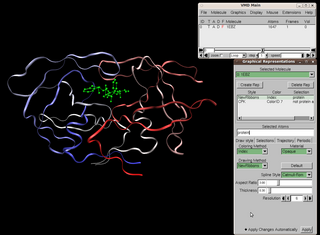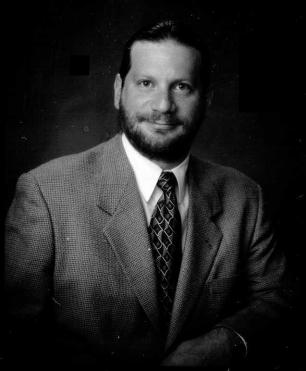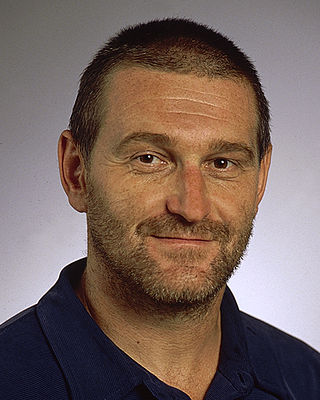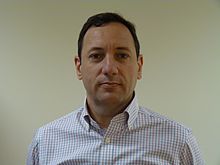
The Department of Computer Science at the University of Manchester is the longest established department of Computer Science in the United Kingdom and one of the largest. It is located in the Kilburn Building on the Oxford Road and currently has over 800 students taking a wide range of undergraduate and postgraduate courses and 60 full-time academic staff.

Visual Molecular Dynamics (VMD) is a molecular modelling and visualization computer program. VMD is developed mainly as a tool to view and analyze the results of molecular dynamics simulations. It also includes tools for working with volumetric data, sequence data, and arbitrary graphics objects. Molecular scenes can be exported to external rendering tools such as POV-Ray, RenderMan, Tachyon, Virtual Reality Modeling Language (VRML), and many others. Users can run their own Tcl and Python scripts within VMD as it includes embedded Tcl and Python interpreters. VMD runs on Unix, Apple Mac macOS, and Microsoft Windows. VMD is available to non-commercial users under a distribution-specific license which permits both use of the program and modification of its source code, at no charge.

The Biocomplexity Institute of Virginia Tech was a research institute specializing in bioinformatics, computational biology, and systems biology. The institute had more than 250 personnel, including over 50 tenured and research faculty. Research at the institute involved collaboration in diverse disciplines such as mathematics, computer science, biology, plant pathology, biochemistry, systems biology, statistics, economics, synthetic biology and medicine. The institute developed -omic and bioinformatic tools and databases that can be applied to the study of human, animal and plant diseases as well as the discovery of new vaccine, drug and diagnostic targets.
Masaru Tomita is a Japanese scientist in the fields of systems biology and computer science, best known as the founder of the E-Cell simulation system and/or the inventor of GLR parser algorithm. He served a professor of Keio University, Director of the Institute for Advanced Biosciences, and the founder and board member of various spinout companies, including Human Metabolome Technologies, Inc. and Spiber Inc. He is also the co-founder and on the board of directors of The Metabolomics Society. His father was the renowned composer and synthesiser pioneer Isao Tomita.
Harold Ray Garner, known informally as "Skip", is a biophysicist with research careers in plasma physics, bioengineering and bioinformatics. Garner was born in St. Louis, Missouri. He received his B.S. degree in Nuclear Engineering at the University of Missouri, Rolla in 1976 and a PhD in plasma/high temperature matter physics from the University of Wisconsin–Madison in 1982. He also holds an honorary professional engineering degree also from the University of Missouri, Rolla.
Douglass Stott Parker was a professor of computer science at UCLA from 1979 to his retirement in 2016, specializing in Data Mining, Bioinformatics, Database Management, Scientific Data Management and Modeling.
Igor I. Goryanin is a systems biologist, who holds a Henrik Kacser Chair in Computational Systems Biology at the University of Edinburgh. He also heads the Biological Systems Unit at the Okinawa Institute of Science and Technology, Japan.

Douglas Bruce Kell is a British biochemist and Professor of Systems Biology in the Institute of Systems, Molecular and Integrative Biology at the University of Liverpool. He was previously at the School of Chemistry at the University of Manchester, based in the Manchester Institute of Biotechnology (MIB) where he founded and led the Manchester Centre for Integrative Systems Biology (MCISB). He served as chief executive officer (CEO) of the Biotechnology and Biological Sciences Research Council (BBSRC) from 2008 to 2013.

Lawrence E. Hunter is a Professor and Director of the Center for Computational Pharmacology and of the Computational Bioscience Program at the University of Colorado School of Medicine and Professor of Computer Science at the University of Colorado Boulder. He is an internationally known scholar, focused on computational biology, knowledge-driven extraction of information from the primary biomedical literature, the semantic integration of knowledge resources in molecular biology, and the use of knowledge in the analysis of high-throughput data, as well as for his foundational work in computational biology, which led to the genesis of the major professional organization in the field and two international conferences.

Pavel Arkadevich Pevzner is the Ronald R. Taylor Professor of Computer Science and director of the NIH Center for Computational Mass Spectrometry at University of California, San Diego. He serves on the editorial board of PLoS Computational Biology and he is a member of the Genome Institute of Singapore scientific advisory board.
COPASI is an open-source software application for creating and solving mathematical models of biological processes such as metabolic networks, cell-signaling pathways, regulatory networks, infectious diseases, and many others.
Charles "Chip" Lawrence is an American bioinformatician and mathematician, who is the pioneer in developing novel statistical approaches to biological sequence analysis.
Daniel Mier Gusfield is an American computer scientist, Distinguished Professor of Computer Science at the University of California, Davis. Gusfield is known for his research in combinatorial optimization and computational biology.
Satoru Miyano is a professor and the director of the M&D Data Science Center at Tokyo Medical and Dental University. He was awarded fellowship of the International Society for Computational Biology (ISCB) in 2013 for outstanding contributions to the fields of computational biology and bioinformatics.
Vineet Bafna is an Indian bioinformatician and professor of computer science and director of bioinformatics program at University of California, San Diego. He was elected a Fellow of the International Society for Computational Biology (ISCB) in 2019 for outstanding contributions to the fields of computational biology and bioinformatics. He has also been a member of the Research in Computational Molecular Biology (RECOMB) conference steering committee.
Keith A. Crandall is an American computational biologist, bioinformaticist, and population geneticist at George Washington University, where he is the founding director of the Computational Biology Institute, and professor in the Department of Biostatistics and Bioinformatics.

Eriko Takano is a professor of synthetic biology and a director of the Synthetic Biology Research Centre for Fine and Speciality Chemicals (SYNBIOCHEM) at the University of Manchester. She develops antibiotics and other high-value chemicals using microbial synthetic biology tools.
Aidong Zhang is a computer scientist whose research topics include machine learning and bioinformatics. She is William Wulf Faculty Fellow and Professor of Computer Science at the University of Virginia, where she also holds affiliations with the Department of Biomedical Engineering and School of Data Science.

Nikolay V. Dokholyan is an American biophysicist, academic and researcher. He is a G. Thomas Passananti Professor and Vice Chair for Research at Penn State College of Medicine.
Herbert M. Sauro is a Welsh biochemist who works in the field of metabolic control analysis and systems biology.








